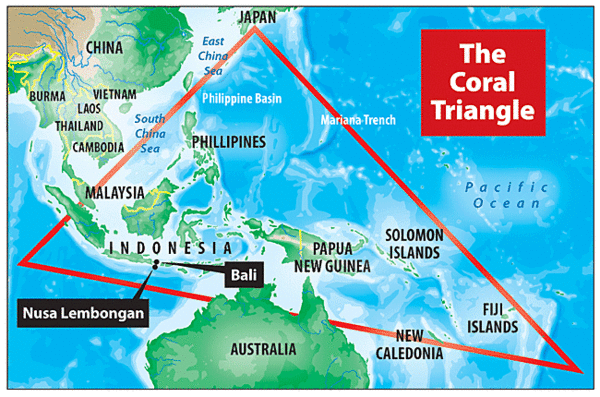CommunityManagement
Community-based Reef Management
Case Study Location- The Coral Triangle
The Coral Triangle includes Indonesia, the Philippines, Malaysia, Papua New Guinea, the Solomon Islands, and Timor-Leste. Currently, the Coral Triangle sustains 590 species of reef-building coral and 4,000 species of fish. [1] In addition, the Coral Triangle provides 120 million people that live in the surrounding area with food, income, and protection from harsh storms. Today, there is a multi-billion dollar tuna industry that relies heavily on the Coral Triangle reefs and its inhabitants, tuna. [2] However, because tuna is a common resource, a resource that is both non-excludable but rival in consumption, this abundant species is experiencing an effect known as the tragedy of the commons. Tragedy of the commons is the tendency of any resource that is un-owned and hence non-excludable to be overused and under maintained. [3] Despite the lack of regulation in the past, many conservationists are educating local fishermen about the destructive fishing methods used such as, dynamite and cyanide.

Characteristics of successful community-based management
It is important to create a coral reef management plan with community input that includes not only ecological conditions but also socioeconomic concerns such as environmental regeneration and preservation of the reefs and livelihood enhancement for communities. We must be careful to not trade off environmental preservation for poverty. The planning process should be transparent and fair. There must be successful communication between administrative/government officials and stakeholders in the community. Community members must have clear and concise rules of access, withdrawal, and exclusion in regards to reefs and reef fish. Some examples of effective rules include: issuing a limited number of fishing permits and creating user organizations so as to monitor any illegal withdrawal of reef fish.
Capacity building within the community, including education and empowerment, is a pivotal part of community-based management. It ensures that community members are both made cognizant of the importance of coral reefs in global biodiversity and take ownership of them. This can be made possible through comprehensive public awareness campaigns and institutional buy-ins. In the event of conflicts, this capacity building combined with effective communication between stakeholders will facilitate conflict resolution.
In the process of planning truly effective community based management, allowing for iterative feedback loops is essential. These feedback loops make it so that government, interested NGOs, and community members can learn from past mistakes and work together for a more sustainable future.
- ↑ http://scientistatwork.blogs.nytimes.com/2013/01/29/diving-into-the-coral-triangle/?ref=reefs
- ↑ http://worldwildlife.org/places/coral-triangle
- ↑ Cowen, Tyler, and Alex Tabarrok. Modern Principles of Economics. 2nd ed. New York : Worth , 2011. 348. Print.
- ↑ http://www.worldfishcenter.org/resource_centre/LessonsLearned1804%20-%20FINAL.pdf
- http://travel.nytimes.com/2007/06/24/travel/24headsup.html?pagewanted=all&_r=0
- http://www.nytimes.com/2012/07/14/opinion/a-world-without-coral-reefs.html
- http://scientistatwork.blogs.nytimes.com/2013/01/29/diving-into-the-coral-triangle/?ref=reefs
- http://www.coralscience.org/main/articles/climate-a-ecology-16/the-coral-triangle
- http://ambergriscaye.com/reefbriefs/briefs13.html
- http://worldwildlife.org/places/coral-triangle
- http://en.wikipedia.org/wiki/Community_management
- Cowen, Tyler, and Alex Tabarrok. Modern Principles of Economics. 2nd ed. New York : Worth , 2011. 348. Print.